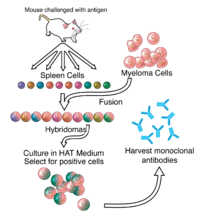
Photo from wikipedia
Objectives The generation of systemic lupus erythematosus (SLE)-related autoantibodies have been shown to be T cell dependent and antigen driven with HLA-DR restriction. In this study, the initiating antigen(s) and… Click to show full abstract
Objectives The generation of systemic lupus erythematosus (SLE)-related autoantibodies have been shown to be T cell dependent and antigen driven with HLA-DR restriction. In this study, the initiating antigen(s) and the mechanism of autoantibody diversification were investigated. Methods T cell epitopes (T-epitopes) of SmD1 (SmD) were mapped by T-T hybridomas generated from DR3+AE0 mice immunised with SmD and with SmD overlapping peptides. TCRs from the reactive hybridomas were sequenced. The core epitopes were determined. Bacterial mimics were identified by bioinformatics. Sera from DR3+AE0 mice immunised with SmD peptides and their mimics were analysed for their reactivity by ELISA and immunohistochemistry. Samples of blood donors were analysed for HLA-DR and autoantibody specificities. Results Multiple HLA-DR3 restricted T-epitopes within SmD were identified. Many T-T hybridomas reacted with more than one epitope. Some of them were cross-reactive with other snRNP peptides and with proteins in the Ro60/La/Ro52 complex. The reactive hybridomas used unique TCRs. Multiple T-epitope mimics were identified in commensal and environmental bacteria. Certain bacterial mimics shared both T and B cell epitopes with the related SmD peptide. Bacterial mimics induced autoantibodies to lupus-related antigens and to different tissues. HLA-DR3+ blood donors made significantly more SLE-related autoantibodies. Conclusions The unique antigenic structures of the lupus-related autoantigens provide the basis for being targeted and for T and B cell epitope spreading and autoantibody diversification with unique patterns. SLE-related autoantibodies are likely generated from responses to commensal and/or environmental microbes due to incomplete negative selection for autoreactive T cells. The production of SLE-related antibodies is inevitable in normal individuals. The findings in this investigation have significant implications in autoimmunity in general.
Journal Title: Annals of the Rheumatic Diseases
Year Published: 2019
Link to full text (if available)
Share on Social Media: Sign Up to like & get
recommendations!